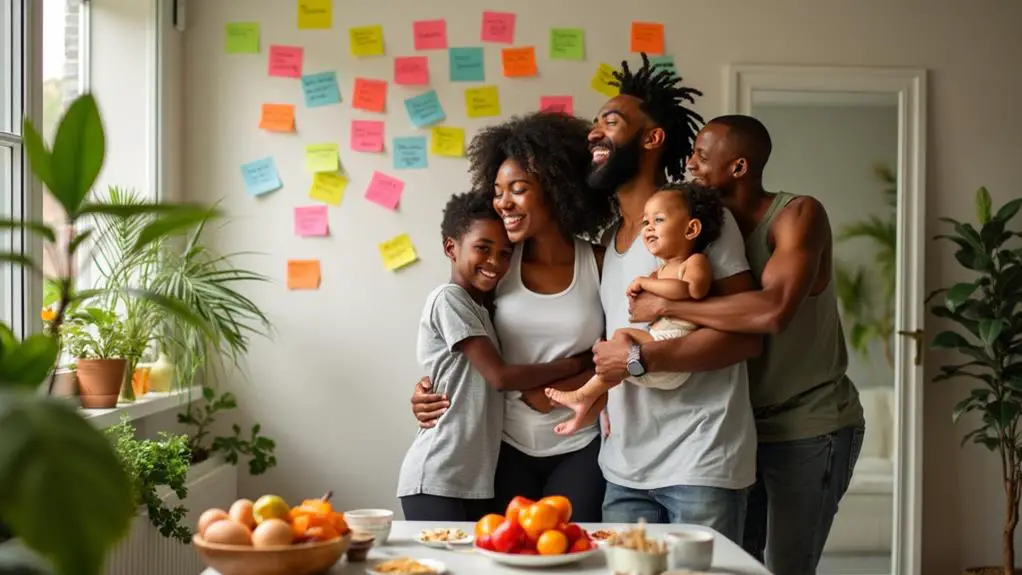Creating a Positive Body Image Environment at Home
To create a positive body image environment at home, start by incorporating diverse and inclusive artwork that celebrates all body types. Place mirrors strategically and add uplifting affirmations nearby. Foster open conversations about bodies, emphasizing functionality over appearance. Curate body-positive media content and celebrate personal achievements unrelated to looks. Create comfortable clothing spaces that prioritize comfort and allow for child-led choices. Use mindful language when discussing bodies and praise non-physical attributes. By implementing these strategies, you'll nurture self-acceptance and boost confidence for everyone in your household. Discover more ways to cultivate a body-positive home environment below.
Key Takeaways
- Display diverse body representations in artwork and decor to promote inclusivity and acceptance.
- Use strategic mirror placement and positive affirmations to encourage self-love and confidence.
- Foster open, mindful conversations about body image, emphasizing functionality over appearance.
- Curate body-positive media content, including social media, literature, and podcasts.
- Create comfortable clothing spaces that prioritize diverse options, comfort, and personal choice.
Uplifting Decor and Artwork
When creating a positive body image at home, one of the most effective ways to start is by incorporating uplifting decor and artwork. Choose pieces that showcase diverse representations of bodies, including various sizes, shapes, and abilities. This fosters an inclusive environment that validates different experiences and identities.
Display motivational quotes or affirmations related to body positivity and self-love, serving as daily reminders for family members to embrace their individuality.
Consider using colors and designs that evoke feelings of calm and positivity, such as soft pastels or vibrant hues. These choices can enhance the overall mood and encourage a supportive atmosphere.
Additionally, rotate artwork that highlights achievements and personal qualities beyond appearance. This shift in focus helps family members appreciate their individual strengths and contributions, promoting a well-rounded sense of self-worth and body positivity.
Mirror Placement and Messaging
You can transform your home into a body-positive environment by strategically placing mirrors at eye level and decorating them with uplifting messages.
Consider limiting the number of mirrors to reduce appearance-focused pressure and encourage self-reflection beyond physical attributes.
Incorporating positive affirmations near mirrors can help you build a stronger sense of self-acceptance and appreciation for your body's unique abilities.
Strategic Mirror Positioning
Thoughtful mirror placement can greatly impact how we perceive ourselves at home. Strategic mirror positioning encourages self-reflection without overemphasizing physical appearance. Instead of full-length mirrors, opt for smaller ones that focus on specific features or expressions. This approach promotes appreciation for body functionality and fosters self-acceptance.
Place mirrors alongside positive affirmations or inspiring messages to create an uplifting environment. Regularly update these messages to reflect diverse body types and counteract societal beauty standards. Encourage children to engage with their reflections positively, reinforcing that their worth isn't tied to appearance.
Consider these mirror placement strategies:
| Location | Purpose | Effect |
|---|---|---|
| Entryway | Quick appearance check | Confidence boost |
| Bathroom | Focused grooming | Reduced body scrutiny |
| Living spaces | Occasional self-viewing | Improved self-acceptance |
Positive Affirmation Displays
Building on the concept of strategic mirror placement, positive affirmation displays can considerably enhance your home's body-positive atmosphere.
Place mirrors with uplifting messages at eye level to encourage daily self-encouragement and boost body appreciation. Use sticky notes with empowering phrases on bathroom mirrors as constant reminders of self-love and acceptance, positively influencing your mental well-being.
Create a designated "self-love corner" to reinforce a culture of positivity and self-acceptance within your home.
Engage your children in crafting their own affirmations and displaying them in shared spaces, fostering a supportive environment that values individual strengths and promotes body positivity.
Family Conversations About Bodies

When discussing bodies with your family, choose your words carefully.
You'll want to avoid negative language about appearance and instead focus on praising non-physical attributes like kindness, creativity, or perseverance.
Mindful Language Matters
Language wields immense power in shaping a child's body image. By using mindful language, you can greatly influence your children's perception of themselves and others. Avoid negative body talk, especially about yourself, as this can inadvertently foster a negative body image in your kids. Instead, focus on promoting self-acceptance and celebrating body diversity.
You'll want to create an environment where open dialogue about bodies is encouraged. This helps children express their feelings and develop emotional resilience.
Remember, even five-year-olds are aware of societal pressures around dieting. Counter these by emphasizing body functionality rather than appearance. By doing so, you're fostering a healthy relationship with their bodies and promoting a positive body image.
Your words matter, so choose them wisely to cultivate confidence and self-acceptance in your children.
Praise Non-Physical Attributes
Beyond mindful language, the way you praise your children can greatly impact their body image. By focusing on non-appearance-related qualities, you'll boost their self-esteem and foster a positive body image.
Celebrate your child's kindness, intelligence, and creativity instead of their looks. This shift in focus promotes self-acceptance and helps children develop a strong sense of self-worth based on their personality rather than societal beauty standards.
To create a home environment that values character over appearance:
- Compliment your child's efforts and achievements
- Discuss their interests and passions regularly
- Acknowledge acts of kindness or thoughtfulness
- Praise problem-solving skills and creative thinking
Curating Positive Media Content
In the midst of today's media-saturated world, curating positive content is essential for fostering a healthy body image at home. You can greatly reduce body dissatisfaction by intentionally including body-positive accounts in your social media feeds. Engage with media that showcases diverse body types to broaden beauty ideals and promote self-acceptance.
| Content Type | Examples | Benefits |
|---|---|---|
| Social Media | Body-positive influencers | Reduces negative effects |
| Literature | Body-inclusive books | Reinforces self-acceptance |
| Audio | Uplifting podcasts | Celebrates diversity |
| Video | Inclusive fitness channels | Promotes healthy lifestyle |
Encourage exploration of uplifting music, podcasts, and videos that celebrate body diversity. Regular discussions about media portrayals can foster critical thinking, helping children and teens navigate societal pressures more effectively. By curating positive media content, you're creating a supportive environment that counteracts harmful messages and promotes a healthy body image for all family members.
Celebrating Personal Achievements

Celebrating personal achievements is a powerful tool for building self-esteem and fostering a positive body image at home. By recognizing individual accomplishments, you'll reinforce a sense of self-worth and encourage a positive self-image among family members.
Studies show that this practice can greatly boost self-esteem and promote resilience, especially in children and adolescents.
To create a supportive environment that celebrates personal growth:
- Incorporate weekly achievement sharing during family dinners
- Praise efforts rather than outcomes in sports or academics
- Recognize both big and small milestones
- Create family rituals that emphasize each person's unique contributions
Creating Comfortable Clothing Spaces
Creating comfortable clothing spaces is a crucial step in fostering a positive body image at home. You can promote self-acceptance and boost self-esteem by offering diverse clothing options that celebrate different body shapes. Encourage your children to choose attire that makes them feel confident and comfortable, reinforcing their autonomy and positive body image.
| Strategy | Benefit | Implementation |
|---|---|---|
| Diverse options | Celebrates body diversity | Stock various sizes and styles |
| Child-led choices | Fosters autonomy | Let kids pick their outfits |
| Comfort-focused | Reduces self-consciousness | Prioritize comfort over fashion |
| Avoid "ideal" body talk | Promotes healthy perspective | Focus on how clothes make them feel |
Conclusion
Picture your home as a sanctuary of self-love. You've filled it with uplifting images, thoughtful mirror placements, and positive conversations. You've curated media that celebrates diverse bodies and focused on personal growth. Your closet's now a haven of comfort, not criticism. As you move through your space, you're enveloped in an atmosphere of acceptance. This environment you've created isn't just a place; it's a powerful reminder of your inherent worth, radiating confidence from within your own four walls.







